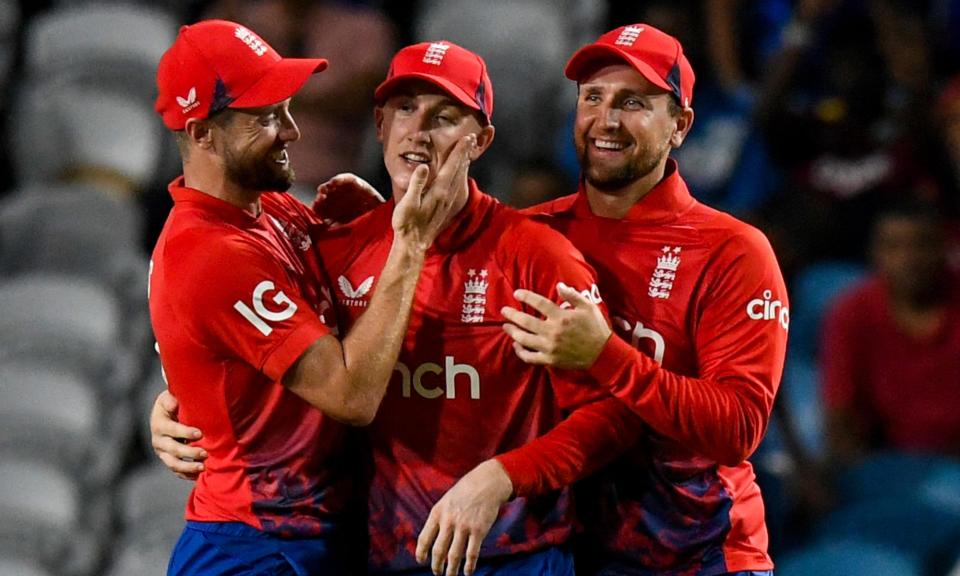
‘Sport is so fickle,” said Matthew Mott, England’s white-ball coach. “You’re up and down all the time. And what you need to do is continue to believe in yourself and believe in the process that eventually it will turn around. There’s too many good players in that squad for it not to have turned around if we kept the positive mindset.”
This was the tour when it did turn around, when those who kept the faith were repaid. And it was also the tour when England lost an ODI series 2-1, and a T20 series 3-2. As great leaps forward go, it looked remarkably like a backwards step. Since winning the T20 World Cup last year England have now played six bilateral white-ball series away from home, in Australia, South Africa, Bangladesh and the West Indies, lost five and won one, while also miserably failing to defend their 50-over World Cup title.
Related: Jos Buttler insists desire to lead England ‘burns strongly’ after West Indies loss
That this latest tour is being seen, and with reason, as evidence of progress and cause for optimism rather than as yet another failure shows where England’s bar is currently set. It is not high.
The positivity is remarkable particularly because after five of the tour’s eight games this England looked adrift. Two matches into the T20 series they were not being beaten by West Indies, they were being ripped apart and toyed with, like a pushbike in Godzilla’s maw.
It was hard to discern any real leadership or direction, any sense of wounded pride or burning desire to improve. There was talk of players disappearing on a match day for a round of golf, apparently unbothered about the inevitable impact it would have on their performance (the obsessive focus on golf shared by many players remains surprising: when in Trinidad the squad was invited to Brian Lara’s house for a party most of them apparently spent it not with the man they call the Prince, but with his golf simulator).
None of it was enormously surprising. This has been a hard year for England’s white-ball team, full of assorted miseries and indignities. Finding themselves, two-thirds of the way through the World Cup, suddenly concerned that they might not qualify for the next Champions Trophy was peak humiliation, reflecting not just the poor performance of the team but also wider organisational dysfunction.
Somehow the players had been alerted to the qualifying process for a major tournament midway through a key match against India, fully two years after it was ratified at a meeting at which the England and Wales Cricket Board itself was represented. Then they were bowled out for 129.
It is no surprise in the circumstances that even glimpses of greatness have been so greedily received, and eventually we got an eyeful. In the third game of the T20 series, chasing 223 to win, Phil Salt scored an unbeaten 109 and Jos Buttler a half-century, but it was Harry Brook’s seven-ball 31 that won the game and strapped a jetpack to the team’s sagging self-belief. Two days later, the action having moved from Grenada to Trinidad, Salt scored another century, Buttler another 50, and both Will Jacks and Liam Livingstone contributed to lifting England’s score to a preposterous and unreachable 267.
And after two games won by the batters came a third, on a worse wicket, where they faltered and responsibility fell on the bowlers. They could not quite defend a paltry 132 but they undeniably rose to the occasion: Adil Rashid and Reece Topley were superb throughout, Chris Woakes good at the start of the innings and Sam Curran at its end, conceding only two in the 19th over. Rehan Ahmed has had an excellent tour and took 11 wickets across both series, more than any other bowler.
By the end of the series, if you squinted a little, it was possible to see a potentially great T20 side taking shape. With a fair wind, the enormous benefit of having fresh memories of playing in the Caribbean, a winter focused on T20s (of the squad for this series only Brook, Ahmed, Gus Atkinson and Ben Duckett, who are in the Test group that travels to India for five Tests starting next month, will be distracted by red-ball cricket) and a fit-again Jofra Archer in the side (less far-fetched than it has been for some time) they would be a fearsome prospect.
After Thursday’s game the players returned to their Port of Spain hotel, where the ECB chair, Richard Thompson, had laid on a few drinks to celebrate the end of the tour and the year, and the chance to switch off after what for many has been a long and draining few months.
They sat for a while, trying to ignore the massive TV screen in the corner of the room that was showing highlights of that evening’s decisive defeat. It was Buttler, in small, unshowy ways perhaps a leader after all, who eventually took it upon himself to deal with it. There has been encouragement here, and disappointment, but it was time to turn off.
Article courtesy of
Source link